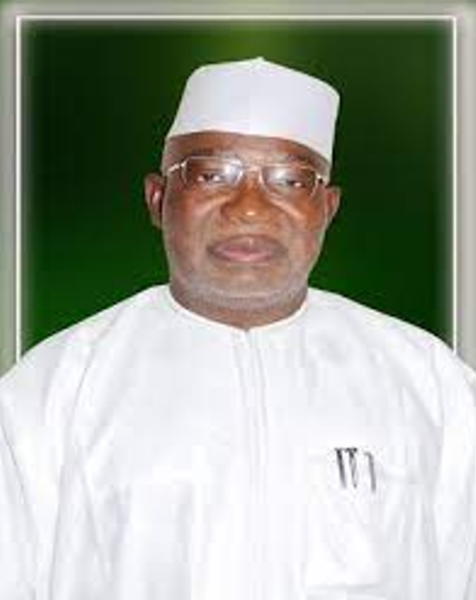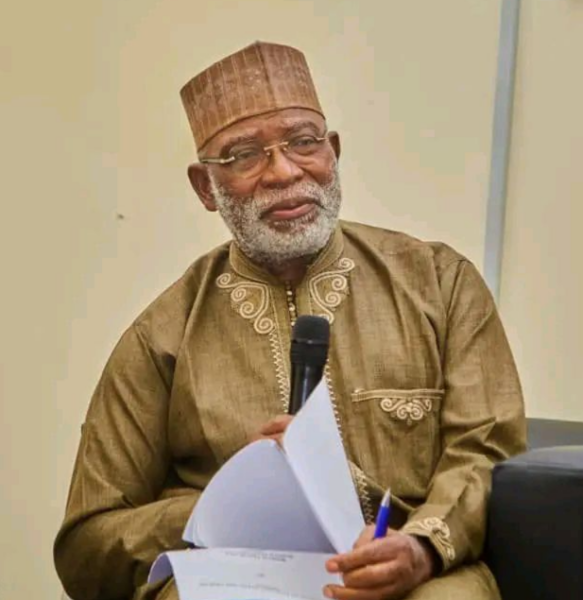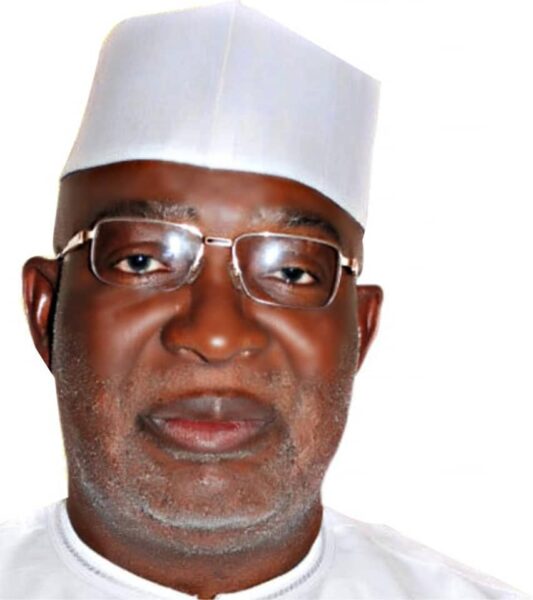December 8, 2024: Professor Nuhu Yaqub was with us in Abuja, in the company of great minds—Jibrin Ibrahim, Yakubu Ochefu, Chris Ogbogbo, Aisha Maikudi, Chido Onuma, Tunji Olaopa, Paul and Paula Edeh, Adagio, Okello Oculi, John Odah and many more. We did a mini-seminar on Jibrin Ibrahim. I invited Nuhu Yaqub to speak, and he gave a great speech, starting with his introduction to Marxism. Days after, we spoke twice on the phone. An active and healthy man was gone within three days of sickness, leaving us and the world on Saturday, January 4. I was hit by his departure with an emotional anguish that is taking a longer time to heal.
I have known him for decades. As the Vice-Chancellor of the University of Abuja, he invited me twice to give two Keynote Addresses. As the pioneer Vice-Chancellor of Sokoto State University, he and Professor Malami Buba, his Deputy, invited me to give the University’s first Distinguished Lecture. We exchanged family visits in Austin and Abuja. A candid man, he did not require efforts for him to stay in mind on all aspects of national issues.
The phenomenon of death remains one mystery that humans, and maybe all living creatures, may not understand for its strange nature. At the superficial level, death signifies the finitude to everything living, and it is in this category of interpretation that we humans lurk ourselves, not because we are sometimes not inclined to see beyond the anguish that is brought when we lose people who are dear to us, but because the human mind is not conditioned to process the shock, the urgency, and the forever delinking which occurs when we lose individuals or cherished pets.
Death is a leveller, for it takes the lives of everything without concerns about the irreparable damage that it does to the people behind it. Losing a giant intellectual and humanitarian energy such as Professor Yaqub has dug yet another deep hole in our national heart and left a hollow space that may be difficult to fill. We feel this way because we consider his demise not as a transition into another phase of human existence, which it originally signifies, but as a finitude to the material importance for which the man is known to his immediate family, academic family and national brotherhood.

To say that I am overwhelmed is to mildly describe my emotional state at the breaking of the news that the selfless individual has passed on. It is such a case for me because, in academic brotherhood, it is not only difficult to come across people genuinely committed to a lifelong philosophy, but it is almost impossible to come across individuals who have the mental energy or the political goodwill to effect changes when they could walk their talk.
But then I am only consoled by the understanding that although Professor Yaqub’s transition might have done unprintable damage to our emotional health because of the various shared ideas, values and virtues, his passing on has foregrounded the irreplaceable importance of committing oneself to a meaningful philosophy. It is on this basis that I highlight the exceptional contributions that this individual made to the human world before his transition.
As a political scientist, it has been established that Nuhu Yaqub devoted his intellectual ambition towards the actualization of better national conditions by facilitating a radical evolution of Nigeria’s political system in ways that address its specific and unique peculiarities. Aware of its diversity, the outstanding Professor had campaigned for inclusive leadership to be embraced by the political players in the country in the spirit of creating a haven for the citizens and forging a country that is capable of answering to the wishes and aspirations of everyone.

To become a national hero in my book, what matters is to demonstrate some consistency in one’s philosophical conviction as long as it does not endanger the human family. I can say confidently that this man was not only consistent about his conviction but also invested in it in every sense. I remember clearly how he staunchly argued and equally supported courses of action that would see to the rapid departure from the colonially imposed political culture in exchange for one that would fix the country and free people from the shackles of ideological suppression.
Unlike many other academics, Yaqub was very practical with his solutions, especially because he understood that the possibility of achieving greatness lies especially in the ability to be deliberate and disciplined. Perhaps this would explain why he irrevocably supported the idea of clinical scholarship, research, and intellectual engagements that would lead to the enthronement of an academic culture that is both vibrant and resilient. He has never refused to educate anyone who cares to listen that research engagement is at the centre of Nigeria’s and Africa’s political transformation, revealing why it is dangerous to compromise on such a commitment.
Would it not be surprising that such a man was foresighted in his examination of our basic sociological and sociopolitical fate, so much so that he campaigned that education was a necessity for everyone if the country would evolve to become a force in the global society? He was motivated to say this because he understood the underlying potential that is lurking in the human and natural resources that the country is blessed with. To become an important force in the world, people have always been required to evaluate events from an impartial angle, and that can only be possible on the occasion that people are given a solid education. It is understandable because many issues that are causing problems in the country are founded on the beliefs that are imposed by individuals who constantly take away the right to education of their citizens.
You would begin to understand and not underestimate his position when you appreciate the place of education in the formulation of policies that are needed for the transformation of a country. I have held numerous dialogues with him, and at every opportunity, no matter how little, he would strike up conversations about national issues that are pivotal to the country’s civilizational advancement. In any case, what dominates such conversations is that education is needed in policy formulation because it is through policies that humans transfer their refined ideas to organized guidelines to be used in guiding the decisions of the government to achieve great outcomes. If people are uneducated, there is a possibility that they will be micromanaged by others who have that advantage. This is the fear of the righteous man who committed to such a just course. He has maintained over time that when people are intellectually refined enough to contribute to the debate of welfare improvement, especially as it relates to them, they would, therefore, be encouraged to participate in the affairs of the country if they are given the fair atmosphere where they can thrive without any external threat.
Away from the strictly professional life that this successful man lived, it would be strange that people of his educational and administrative stature still maintained a life of humility and embrace, as he did not consider himself as being superior to people on account of his giant strides in life. Evidence of his selflessness and humility abounds as people with whom he shared one thing or the other have attested to how he opened his space to anyone who wants to experience it.
For a man who was erstwhile Vice Chancellor of the University of Abuja, the information about how to manage opposing opinions to drive the monumental changes that are recorded in the academic institution today cannot cease to amaze people. More than anything, they are indicators that he was professionally inclined and discharged his very responsibility with a great sense of commitment and demeanour. It cannot be overemphasized how his simple nature infected many of the people who have come across the man in different spheres of existence. I cannot stress enough how his sudden demise has brought some hard reality that is difficult to swallow.

How else can we describe the individual as great, especially in the course of academic liberation, if not through a series of great initiatives he made to improve the conditions of things? It was under him as a Vice Chancellor that the University moved out from their temporary site to the permanent one, which required a great deal of sacrifice from members of staff, and he championed it. Not minding the personal and professional costs that this demanded, Professor Yaqub became an important figure in shaping the university. It is no coincidence that his death has sparked a national reflection as people who have either benefited from the largesse of his professional responsibilities or those who had personal relationships with him continue to reveal how his demise has become a national melancholy.
It is understandable for them to feel this way. I have become so engrossed in his scholarly interests and contributions that his sudden departure to the great beyond has dug a hole in my heart.
اللَّهُمَّ اغْفِرْ لَهُ وَارْحَمْهُ وَأَدْخِلْهُ فِي جَنَّتِكَ
Allahummaghfir lahu warhamhu wa adkhilhu fee jannatika.
Translation: O Allah, forgive him, have mercy on him, and admit him into Your Paradise.


![[OPINION] Professor Nuhu Yaqub, 1951 to 2025: The Departure of a Great Man - Toyin Falola](/media/k2/items/cache/8264e96126200b205ed4df988b83872f_XL.jpg)